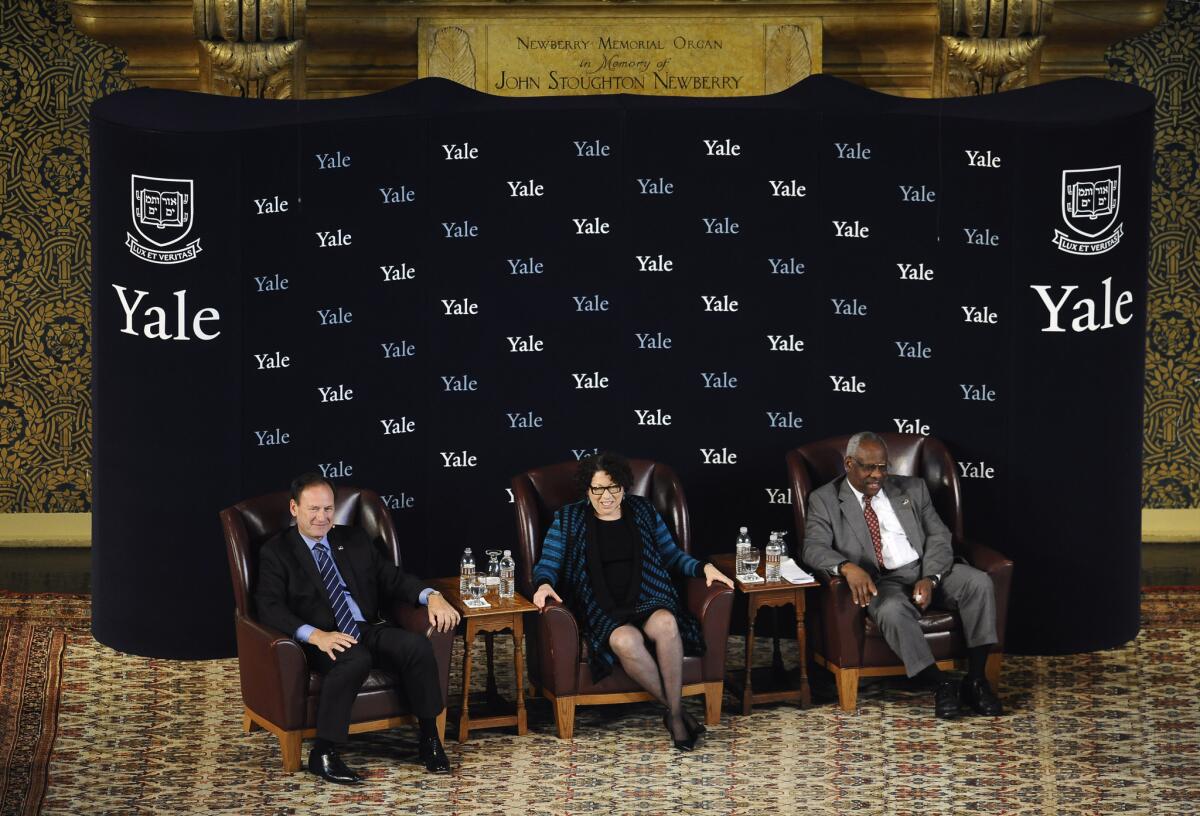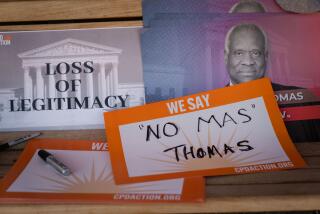Opinion: How to diversify the Ivy League club that is the Supreme Court

Easy for them to say, since they’re already on the Supreme Court, but three justices agreed the other day that the court isn’t diverse enough. In a forum at their alma mater, Yale Law School, Clarence Thomas, Sonia Sotomayor and Samuel A. Alito Jr. said the court would benefit if so many of its members didn’t have similar backgrounds -- including educational backgrounds.
“I think we have to be concerned that almost all of us are from two law schools,” Thomas said, according to a New York Times report. The other six justices all attended Harvard Law School, although Justice Ruth Bader Ginsburg transferred to Columbia Law School and graduated from that Ivy League institution.
There are several explanations for the concentration of Ivy League graduates on the court (over and above the obvious one that Harvard and Yale law schools are top-drawer). One factor is the relatively recent trend of presidents choosing Supreme Court nominees from the federal bench rather than from the ranks of politicians. Granted, some governors and senators also attended Harvard and Yale law schools (Jerry Brown attended Yale Law School), but in general politicians tend to have a diverse educational background.
Another explanation for the glut of Ivy League justices is that with the increasing politicization of Supreme Court confirmations, picking someone with excellent paper credentials – especially a law degree from Harvard or Yale – removes one possible source of opposition. Harriet Miers, George W. Bush’s failed nominee to the court, might have fared better had she received her law degree from one of the Big Two instead of from Southern Methodist University.
But here’s another factor that the justices could do something about: the prevalence of Harvard and Yale law school graduates among the recent law school grads who serve as clerks at the Supreme Court. It would be an exaggeration to say that there is a clerk-to-court pipeline. But several justices past and present served as law clerks at the court.
They include, on the current court, Chief Justice John G. Roberts Jr. and Justices Elena Kagan and Stephen Breyer. Roberts’ predecessor, William H. Rehnquist, and retired Justice John Paul Stevens also served as clerks. Neither, though, graduated from an Ivy League law school. Rehnquist went to Stanford Law (though he had a graduate degree from Harvard), while Stevens graduated from Northwestern’s law school.
A Supreme Court clerkship doesn’t guarantee a Supreme Court appointment, but it is a golden credential in the legal world. So where do the clerks come from? With some exceptions, the same law schools their new bosses attended.
A list published on the website “Above the Law” contains the names of 39 law clerks for the current term. (That’s four clerks for each active justice and one apiece for retired Justices Sandra Day O’Connor, David H. Souter and Stevens.) Of the 39, I count 22 graduates of Harvard or Yale law schools.
(Thomas, who raised the issue of educational diversity on the court, practices what he preaches. One of his clerks is a Yale alumn; the others graduated from Duke, the University of Virginia and Brigham Young.)
If the justices really want to diversify the ranks of clerks, they can engage in some affirmative action to try to identify outstanding graduates from non-Ivy and non-elite schools, and they can encourage the federal appeals court judges who serve as “feeders” for the high court to do the same when they hire clerks.
Of course, if you limit your dragnet to a handful of elite law schools, you can be assured that you’ll be hiring excellent young lawyers. But not all brilliant lawyers graduated from Harvard, Yale, Columbia or Stanford. Some of them attended state law schools in so-called flyover country. The justices should make more of an effort to search them out. Some of them might also be potential justices.
Follow Michael McGough on Twitter @MichaelMcGough3
More to Read
A cure for the common opinion
Get thought-provoking perspectives with our weekly newsletter.
You may occasionally receive promotional content from the Los Angeles Times.






